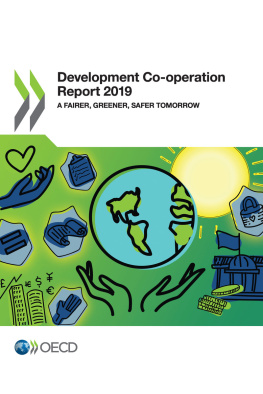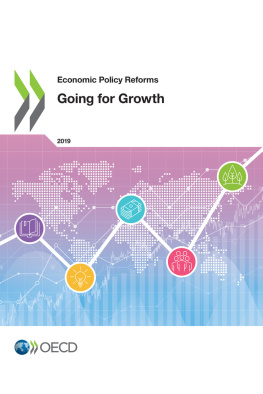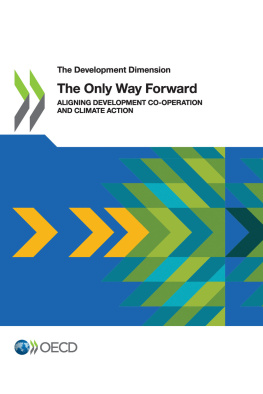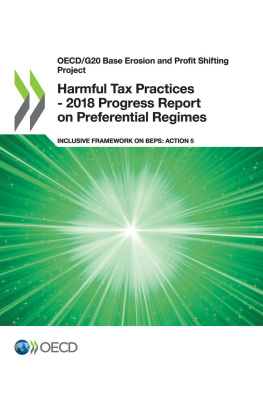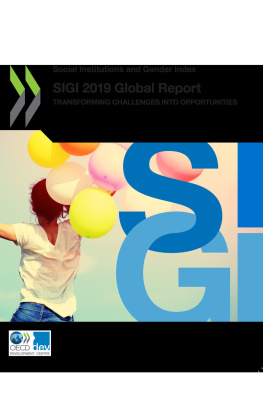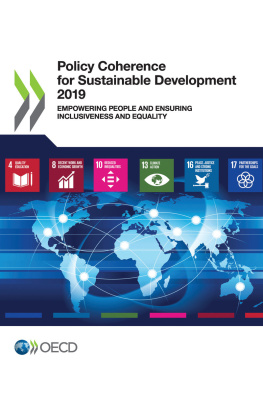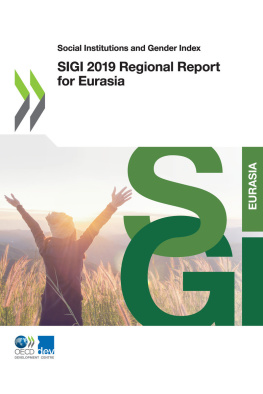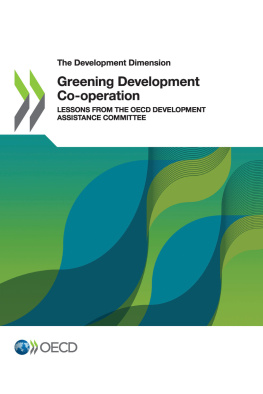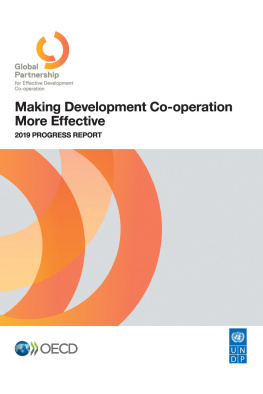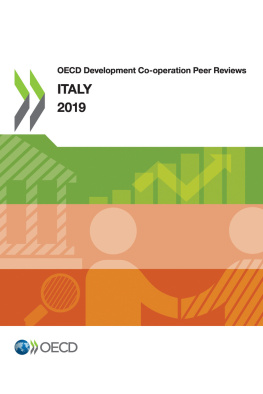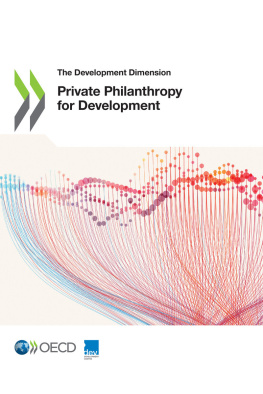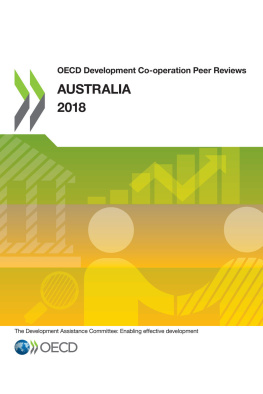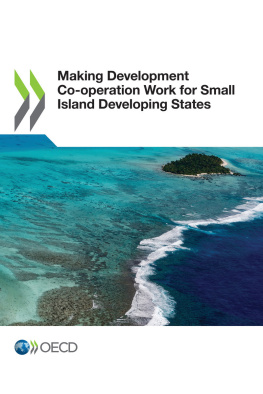OECD - Development Co-operation Report 2019
Here you can read online OECD - Development Co-operation Report 2019 full text of the book (entire story) in english for free. Download pdf and epub, get meaning, cover and reviews about this ebook. year: 2019, publisher: OECD Publishing, genre: Politics. Description of the work, (preface) as well as reviews are available. Best literature library LitArk.com created for fans of good reading and offers a wide selection of genres:
Romance novel
Science fiction
Adventure
Detective
Science
History
Home and family
Prose
Art
Politics
Computer
Non-fiction
Religion
Business
Children
Humor
Choose a favorite category and find really read worthwhile books. Enjoy immersion in the world of imagination, feel the emotions of the characters or learn something new for yourself, make an fascinating discovery.
Development Co-operation Report 2019: summary, description and annotation
We offer to read an annotation, description, summary or preface (depends on what the author of the book "Development Co-operation Report 2019" wrote himself). If you haven't found the necessary information about the book — write in the comments, we will try to find it.
OECD: author's other books
Who wrote Development Co-operation Report 2019? Find out the surname, the name of the author of the book and a list of all author's works by series.
Development Co-operation Report 2019 — read online for free the complete book (whole text) full work
Below is the text of the book, divided by pages. System saving the place of the last page read, allows you to conveniently read the book "Development Co-operation Report 2019" online for free, without having to search again every time where you left off. Put a bookmark, and you can go to the page where you finished reading at any time.
Font size:
Interval:
Bookmark:
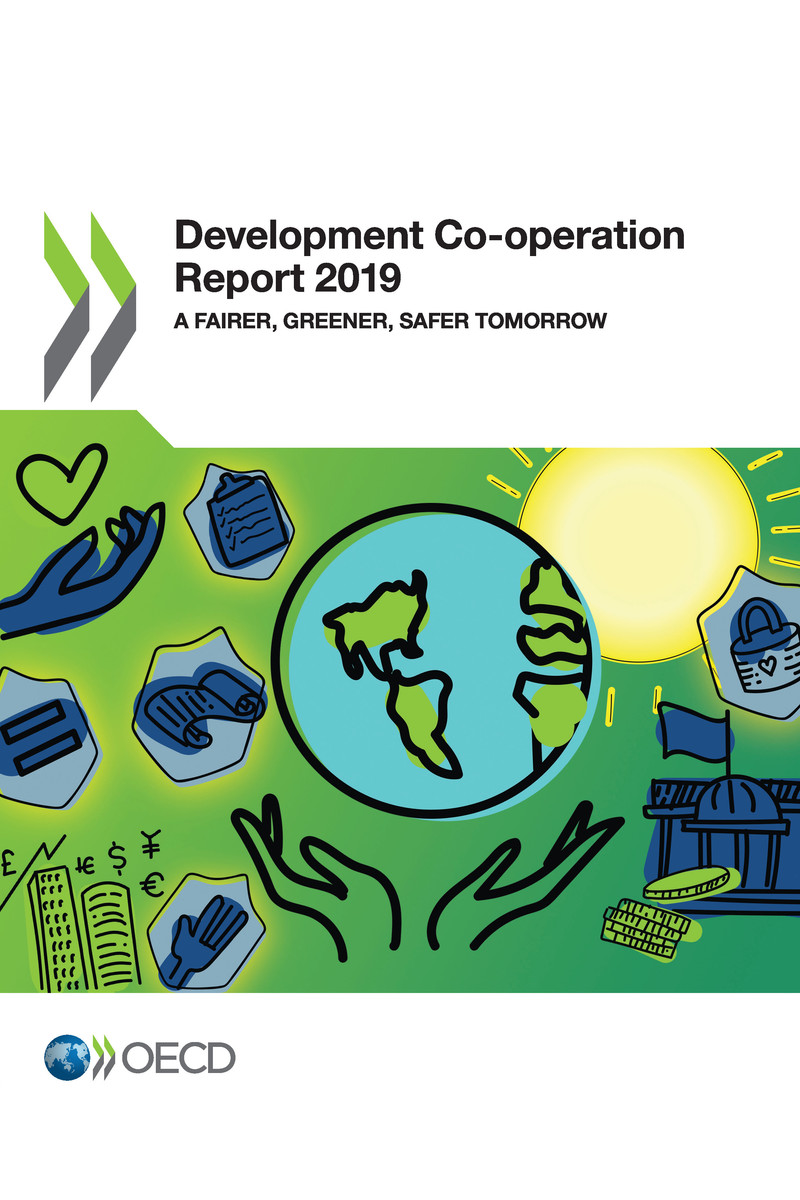
OECD (2019), Development Co-operation Report 2019: A Fairer, Greener, Safer Tomorrow , OECD Publishing, Paris, https://doi.org/10.1787/9a58c83f-en .
Everyone gains from international co-operation for development
Why co-operate with developing nations? The finance, knowledge and ideas that flow through development co-operation stem from solidarity, a moral imperative to help our fellow humans, as well as from a very rational quest for mutual benefits. We will not be able to achieve fairer and more inclusive economic growth in our societies without greater global sustainable development.
The challenges we face today climate change, widening inequalities and conflicts, among others are not contained within national borders. Neither are the solutions. The 2030 Agenda for Sustainable Development and the Paris Agreement are grounded in the understanding that tackling major systemic problems and the political, economic, social and environmental crises confronting the world requires greater international co-operation.
Citizens worldwide are voicing their frustration and challenging leaders to act for climate and global justice. Those citizens live in wealthier countries where globalisation has left people and groups behind, in small island developing states that face the immediate threats of global warming, in authoritarian societies where expressing dissent carries great personal risk, and in poor countries that will suffer the most from climate change. They are the shareholders, the stakeholders and the partners of co-operation for development. Yet governments struggle to engage them meaningfully, to tell the complex and politically charged story of co-operation in compelling words that speak to all generations, and to respond to citizens own aspirations.
The 2019 Development Co-operation Report calls on providers of development co-operation to change course. We need a new narrative that goes beyond the rhetoric of us and them, we need to demonstrate how development co-operation contributes to better lives by supporting peace building, through quality early childhood programmes that give equal opportunities to girls and boys, or by building more autonomous administrations capable of cracking down on tax evasion.
We also need more resolute action by the development community to constantly improve their policies, adapt them to changing geopolitical and technological realities, and uphold the highest transparency and accountability standards.
Development co-operation cannot create a perfect world, but it does help create a better one. OECD governments and their agencies need to show, through greater actions and investments, that development co-operation is fit to take on 21st century challenges, and that it is open to working with diverse actors. The OECD will champion this reports call to action, with the ultimate goal of fostering better lives in all parts of the world.

Angel Gurra,
OECD Secretary-General
The annual Development Co-operation Report brings new evidence, analysis and ideas on sustainable development to members of the OECD Development Assistance Committee (DAC) and the international community more broadly. The objectives are to promote best practices and innovation in development co-operation and to inform and shape policy reform and behaviour change to realize better lives and the sustainable development goals for all. Each year, the report analyses a policy issue that is timely, relevant or challenging for development co-operation policy and finance. It also includes annual development co-operation at a glance data for over 80 providers of development co-operation including members of the OECD, the DAC, other countries and philanthropic foundations.
This 57th edition is intended to align development co-operation with today's most urgent global priorities, from the rising threat of climate change to the flagging response to the Sustainable Development Goals and the 2030 Agenda. The report provides OECD members and other development actors with evidence, analysis and examples that will help them to reinvigorate public and political debates at home and build momentum for the global solutions that today's challenges demand.
The OECD Development Co-operation Directorate decided to produce a different report compared to previous editions in response to requests from member states to tell a more comprehensive story about development co-operation today why it matters, what it achieves, and how and what it can do better. We were challenged to tell a story that will reach new audiences such as the passionate activists of all ages and especially youth who are demanding action for a better tomorrow. Building on the analysis, evidence and recommendations from a series of reports the Directorate published in 2019, this Development Co-operation Report reviews progress towards sustainable development and concludes with recommendations to bring the full capacities and resources of the development system to bear on the immense challenges of our time.
The report comprises two chapters. The first chapter tells an upbeat story, packed with evidence and examples, about development co-operation today. It makes the case for a change of course that features a new narrative and more tangible action. The second chapter contains one-page infographics that provide an overview of emerging trends and insights regarding official development finance and presents individual profiles with key data and policy priorities of official and philanthropic providers of aid, official development assistance and development finance.
The full report is published in English and French and in the form of multilingual summaries. An electronic version, together with other supporting material, is available on line at https://www.oecd.org/dac/development-cooperation-report/ .
Font size:
Interval:
Bookmark:
Similar books «Development Co-operation Report 2019»
Look at similar books to Development Co-operation Report 2019. We have selected literature similar in name and meaning in the hope of providing readers with more options to find new, interesting, not yet read works.
Discussion, reviews of the book Development Co-operation Report 2019 and just readers' own opinions. Leave your comments, write what you think about the work, its meaning or the main characters. Specify what exactly you liked and what you didn't like, and why you think so.

